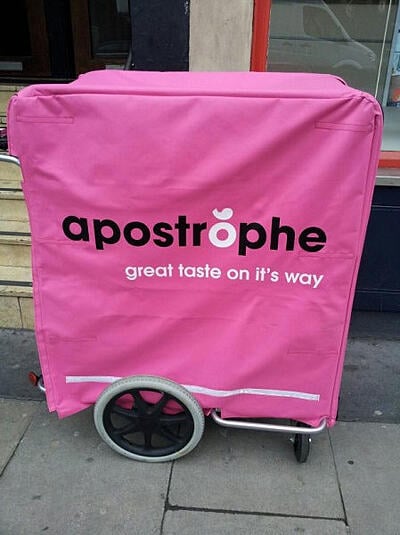Grammar is a funny thing. Some people are absolute sticklers about it, and others don’t think it really matters. We don’t talk in grammatically correct sentences (if we did we would sound like robots), and the Internet is constantly influencing the way we write and speak.
But your hotel website is a different beast. While it’s true that you want your content to be casual and conversational, you also don’t want to deter visitors with any obvious copywriting errors on your marketing assets.

You have a very small window of opportunity to grab attention, and visitors could make judgments about the quality of your accommodation if they see spelling mistakes or grammatical errors in your descriptions. Google won’t penalise you directly for those mistakes, but it will push your website down in the search results if people are leaving in high numbers.
So what mistakes are common on hotel websites? And how can you fix them? Don’t worry, it’s pretty easy – just follow these simple proofreading tips.
Misplaced apostrophes
There is quite a bit of confusion about apostrophes. I see them being used oddly all the time – even on TV advertisements and street signs!

It’s actually pretty simple if you remember this: there are only two instances when apostrophes should be used:
- To indicate that a person, object or thing possesses something in the sentence – for example “That is Mary’s TV,” “This month’s weather is going to be fine.”
- To indicate that a letter is missing - for example in the sentence “He’s on his way down the hill”, ‘He’s’ features an apostrophe because it merges together ‘he’ and ‘is’. These words are called contractions (so he’s, she’s, hasn’t, shouldn’t, wasn’t, isn’t, can’t, and so on).
And that’s it. Those are the only two times you should use an apostrophe. The confusion tends to come in when there’s a plural, like cafes. I think high school English teachers have scared people so much they insert apostrophes into words as soon as they see that s, without really thinking about what they’re doing!
Just remember that unless something in the sentence belongs to the cafe, there’s no need for an apostrophe. This rule also applies when the word is an abbreviation like TVs or a year like 1990s – there is no need for an apostrophe in either of these cases.
Hotels cheat sheet:
- TVs not TV’s
- DVDs not DVD's
- BBQs not BBQ’s
- 90s not 90’s
- Cafes not café’s
- Parking bays not parking bay's
Misused words
There are some words that are so similar it’s easy to confuse them. But they actually mean very different things, and treating them interchangeably can change the message you’re trying to convey.
Here are the main ones to look out for:
You’re and your
This comes back to what I was saying about apostrophes. You’re is a contraction of you are, which means it should only be used in that context. Your is used to demonstrate that you own something – for example your suitcase, your bike, your room.
There, their and they’re
Their is the possessive form of they (so their suitcase, their bike, their room). There refers to a place. They're is a contraction of they are.
Whose and who’s
Who’s is the contraction of who is. Whose is the possessive version of who (“whose room is that?”)
Compliment and complement
This comes up quite a lot in hotel descriptions. When you want to say that something in your room accompanies something else well, you would write “the décor complements the beautiful architecture of the hotel.”
All other uses involve the other spelling – so a free breakfast is complimentary. And when you’re flattering someone you are complimenting them. As a result, you should use with compliments not with complements.
Affect and effect
I personally struggle with this one all the time. The difference is this: affect is used when something or someone influences something else, for example "the hotel is affected by the cyclone." Effect is used to describe an end result, for example “The rain had an effect on my hair.” Here's a trick you can use - if you're in doubt, avoid the word altogether and use a synonym like impact.
Passed and past
Passed is the past-tense version of pass, as in “to move forward.” Past refers to a period that is now over, or a direction, for example, “The hotel is ten minutes past the central shopping centre.”
Writers tend to get this confused when they are talking about movement. The easiest way to tell if you have the sentence right is to rewrite it in the present tense: “The hotel is ten minutes pass the central shopping centre”. You can immediately see that this is incorrect.
Capitalisation
Capitalisation is overdone on a lot of business websites. It’s seen as an effective way to draw attention to certain words, which is true. But it can look clunky in the middle of a sentence, especially when it doesn’t belong.
As a general rule, the only words that should be capitalised are proper names (Emma, David, Four Seasons Hotel) and place names (Melbourne, New York, Smith Street). So the ‘hotel mini-bar’ should not be ‘the hotel Mini-Bar’.
However, your room names can be capitalised because they are technically titles.
You might also decide to capitalise all of the words in your headings and subheadings. That is completely fine - just be consistent in your choice. For example if you only capitalise the first word in each heading, you should do this across the rest of the site.
Hyphens
It may not seem like it at first glance, but hyphens can change the whole meaning of a sentence.
Take the phrase “hot-water bottle.” When it contains a hyphen, it is referring to the hot-water bottle that you put in your bed. But when it doesn’t contain a hyphen – hot water bottle – it’s referring to a water bottle that is literally hot.
To help you out, we’ve put together a quick list of hotel-related phrases that should contain hyphens.
Hotels cheat sheet:
- Wi-Fi
- Off-street parking
- First-class
- Low-budget
- Full-time
- Family-style
- Pre-1980s
Putting together a style guide
So how do you prevent these mistakes from making a reappearance when different people are contributing to your website?
It helps to put together a basic style guide so that your writing comes across consistently. I know it sounds a bit rigid, but it’s a great way to define how you want your hotel to be portrayed to the outside world. And if you ever hire a copywriter, you can use this document to quickly communicate your standards.
Other things you might like to make a decision about include:
- Whether you're going to use American or British spelling
- Whether you're going to spell out words ("eight") or use digits
- What words should be used when referring to your accommodation ("motel", "hotel", "inn", etc.)
A final proofreading tip
While a correctly proofed website is important, I want you to put all of this out of your mind when you’re writing your content. You don’t want to paralyse yourself with uncertainty.
If you’re handling your own copywriting (or perhaps running your own blog), just turn off your inner critic and have fun with it. Come back later to handle the proofreading side of it!
Do you have any questions about writing or grammar? Let us know in the comments!
.gif?width=1200&height=400&name=Hubspot%20Blog%20banner%20GIF%20(2).gif)


